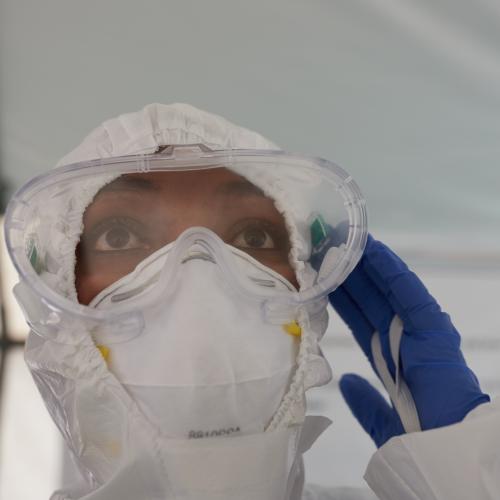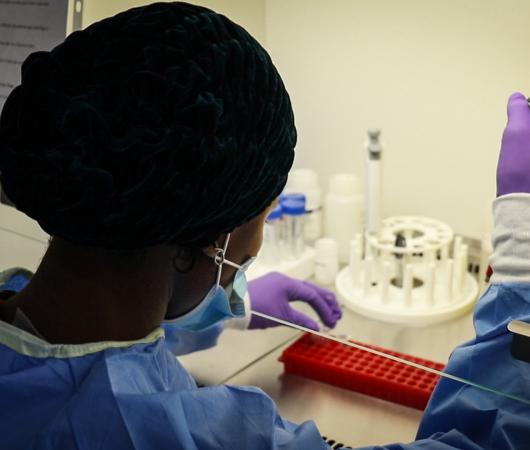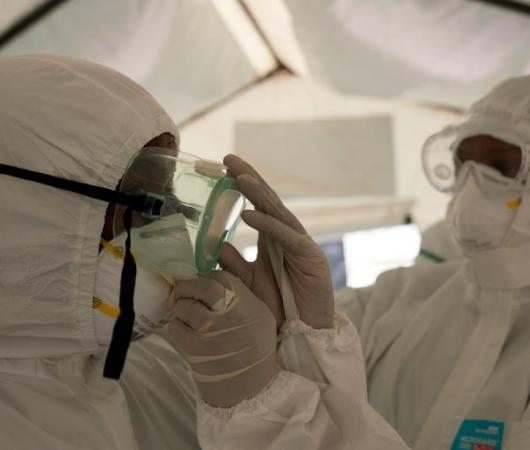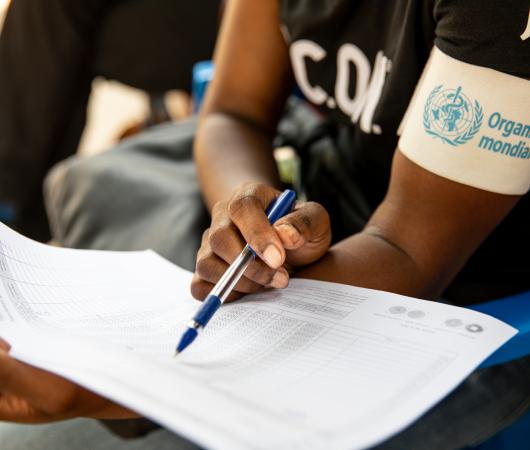- WHO Africa
- Health topics
- Coronavirus (COVID-19)
- Africa marks two years of COVID-19 fight
Africa marks two years of COVID-19 fight

Africa is marking its second year battling COVID-19. Since the onset of the COVID-19 pandemic, WHO has been at the forefront of the efforts to bring the virus under control, working at the political, strategic, technical and community levels to curb the spread of the infection and support countries in the response. In Africa, the Organizations is spearheading crucial response coordination and leading the push to step up diagnosis, treatment and prevention as well as reinforce community engagement and vaccine supply and uptake. WHO is channelling its support through various means, including by deploying experts to support countries, shipping critical medical supplies, training and providing technical guidance on the various aspects of the pandemic response. This support, done collaboratively with governments and partner organizations, has saved lives, helped slow down the spread of the virus and enhanced country-led responses. Two years since the advent of COVID-19, WHO has strongly advocated international solidarity and equity in accessing critical diagnostics, therapeutics and vaccines to overcome the pandemic. In Africa, significant steps against the pandemic have been made despite the challenges.
Laboratory
COVID-19 testing has greatly improved in the region. At the onset of the pandemic, only two countries in the region had the capacity to test for the virus. With the support of WHO and partner organizations, including United Nations agencies, regional economic bodies and international aid organizations, all countries and over 900 laboratories can now detect the virus using the standard polymerase chain reaction method. Testing has been further boosted with antigen rapid diagnostic tests introduced in the region in October 2020. To date, more than 93 million tests have been carried out through PCR and rapid tests.
Additionally, WHO and partners have set up a network of genomic surveillance laboratories to track, identify and bolster response to COVID-19 variants. So far, more than 74 000 genomes have been produced by the laboratory network. The Organization also helped establish a Regional Centre of Excellence for Genomic Surveillance and Bioinformatics in Cape Town to initially support 14 countries in Southern Africa before being expanded to serve more countries in other sub-regions.

Mauritania: champion of COVID-19 vaccination in Africa
Six in seven COVID-19 infections go undetected in Africa
Logistics and Supplies
To help countries effectively tackle the pandemic, WHO, with other United Nations agencies and partners, has played a pivotal role in securing and delivering consignments of essential medical supplies and equipment for diagnostics, infection prevention and control as well as treatment among other needs.
To date, 6671 oxygen concentrators, more than 400 ventilators, 1516 patient monitors as well as 15656 pulse oximeters have been shipped 47 Member States. Additionally, about 105.6 million items of personal protective equipment, 70.4 million laboratory tests and reagents, including 50.4 million rapid diagnostic test kits and 7.4 million sample collection kits have been delivered to countries. WHO is working tirelessly to procure more medical supplies for the region by replenishing the WHO regional stock hub in Accra with essential items including biomed and personal protective equipment.
Sierra Leone steps up countrywide COVID-19 vaccination
Treatment
Together with donors and partners, WHO has made strides in boosting treatment capacity as the continent battles the pandemic and waves driven by more infectious variants. More than 12 000 medical officers and 44000 nurses across the region have been trained in COVID-19 treatment. The Organization has also supported countries to update their national treatment and therapeutics guidelines to include novel recommended COVID-19drugs. Over the past two years, international medical emergency teams have been deployed to 25 countries where more than 6000 health workers have been trained.
Crucial to the treatment of critically ill COVID-19 patients is medical oxygen. Many African countries still grapple with huge production shortfalls of medical oxygen that existed before the pandemic. With the support of WHO, at least 363 oxygen production plants have so far been built or repaired across the region, up from 68 at the start of the pandemic. WHO has also developed a protocol for service, repair and maintenance of oxygen production plants in the region which had 26 plants in disrepair. Overall, 15 countries have been supported to improve manufacture, delivery and maintenance of oxygen plantswhich have increased production by about 25 million litres a day and reduced oxygen costs by 40%.
Risk Communication and Community Engagement
One of the crucial ways to boost COVID-19 response is by providing accurate information as well as mobilizing communities to support the efforts to control the virus. Over the past year, the WHO Risk Communication and Community Engagement pillar has played a vital role in promoting adherence to preventive measures and acceptance of COVID-19 vaccine by providing timely, reliable and relevant information to manage the misinformation and ensure the people-centred and community-led approaches are championed widely, resulting in stringer advocacy, increased trust and training of health workers.
Since the beginning of the pandemic, 5000 national experts have been trained on the key areas of community engagement, including coordination with partner organizations and addressing misinformation and rumours. Twenty-seven countries have been supported to carry out knowledge, attitude and practice studies to better understand and respond to community concerns. Countries have also reinforced collaboration with national media, health promotion teams and religious leaders to enhance community involvement in COVID-19 prevention and response. In collaboration with WHO, the University of Kansas has developed an online platform on Risk Communication and Community Engagement to monitor and evaluate COVID-19 response in countries.
Infection Prevention and Control
WHO has worked in collaboration with countries to improve COVID-19 infection prevention and control in health care facilities and public spaces. The Organization together with its partners has trained at least 200 000 health workers through virtual sessions and in-person training. Guidelines have been developed and disseminated centring on all the necessary measures needed to break the chain of transmission of COVID-19, in healthcare facilities as well as in the communities.
WHO has also provided crucial support to countries working to improve infection prevention and control measures in healthcare facilities. This has been done through assessment of healthcare facilities, developing action plans, implementing corrective measures and reassessment to measure the impact of the intervention.
More than 3000 healthcare facilities from 18 countries have been supported in that process with focus on triage and isolation capacities, hand hygiene practices, supply of personal protective equipment, waste management, reprocessing of reusable materials, cleaning and disinfection, water supply, sanitation and hygiene. To ensure the implementation of all these measures, international experts in infection prevention and control have been deployed to work with countries.


Surveillance
WHO has been working with countries to provide technical support to strengthen COVID-19 surveillance including alert management systems for early detection of cases, epidemiological investigations, contact tracing as well as data management and analysis for strategic decision-making. The Organization has also deployed epidemiologists and data analysis experts to help ministries of health set up alert management systems and provided technical guidance on surveillance, contact tracing, case investigations and issued protocols on epidemiological studies.
To provide data analysis to countries and perform short-term prediction, WHO has collaborated with the Association Action en Santé Publique and the South African Centre of Excellence in Epidemiological Modellingand Analysis to develop automated templates for data cleaning, analysis and perform short-term prediction. Countries have also received technical support on the expansion of interactive geographic information systems dashboards, including a series of tools such Go.Data—a WHO outbreak investigation tool—WHO's Early Warning, Alert and Response System, and the Organization’s polio programme geographic information system platform and outbreak toolkit for countries lacking national platforms.
WHO urges greater surveillance as new COVID-19 variants emerge
Bolstering COVID-19 surveillance in Lagos


